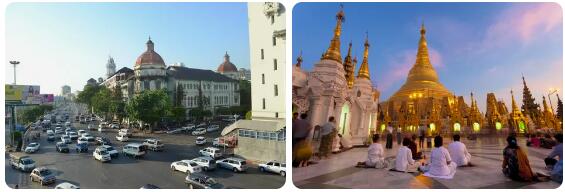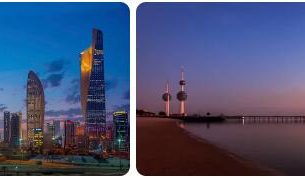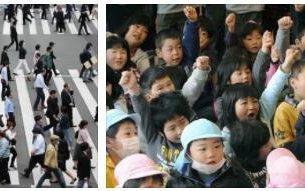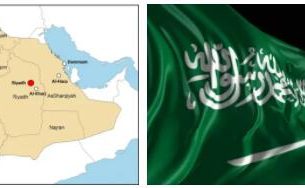Myanmar was called Burma or Burma until 1989. Often also called the “land of the pagodas”.
With its ubiquitous pagodas, Burma is one of the countries where the Buddhist belief is deeply rooted to this day.
Due to its remoteness and the countless pagodas that are scattered across the Burma countryside, the country has something fairytale about itself for outsiders.
Myanmar is in the north of the golden triangle, which also includes Thailand and Laos.
It is the largest country in mainland Southeast Asia. It stretches from the Himalayas to the Bay of Bengal. Large parts of the country are flat and crossed by large navigable rivers.
Until 1962, Burma was the largest producer of rice in the world.
Myanmar is a country that has so far remained untouched by the large tourist flows. This is largely due to the regime, which has only recently started to open up to tourism.
It is a military dictatorship, but the traveler can hardly feel it.
Myanmar was still a well-developed travel destination when the British occupied the country. In the 20s of the 19th century, people traveled on the Irrawaddy River to the legendary Mandalay, now the second largest city in Myanmar. The steamship fleet in this region was one of the largest in the world at the time.
At the beginning of May 2008 the tropical cyclone swept “Nargis” across the country. The devastation he caused far exceeded the consequences of other cyclones: at least 40,000 people were killed, over 100,000 were injured and over a million people were left homeless. Even in Rangoon, all public life collapsed. Despite the enormous devastation, the corrupt, incompetent and brutal rulers of the country – with few exceptions – did not allow any foreign aid organizations into the country.
Democratization of the country
Since the end of 2011/beginning of 2012, the country began cautiously opening up and beginning cautious democratization efforts. For example, Aung San Suu Kyi, the 1991 Nobel Peace Prize laureate, who was under house arrest for around 15 years, was able to take part in the parliamentary by-election on April 1, 2012 and win one of the 44 seats to be awarded.
| Name of the country | Myanmar, Union of Myanmar |
| Independence | The country gainedindependence from Great Britain on January 4, 1948 |
| Form of government | Military dictatorshipsince early 2012 with careful democratization efforts |
| Geographical location | South East Asia |
| National anthem | Gba majay Mymar pyay |
| Population | approx. 59.1 million residents (the information varies widely) (Credit: Countryaah: Myanmar Population) |
| Ethnicities | 68% Burmese9% Shan
7% Karen 4% Rakhine 3% Chinese 2% Indian 2% Mon 5% others |
| Religions | around 89% Theravada Buddhistsaround 5% Christians
around 4% Muslims around 0.5% Hindus around 2% followers of natural religions and some Confucians |
| Languages | Burmese is spoken as the first language byaround 70%, along with Arakenesian,
Chin, Mon, Karen and Shan |
| Capital | Nay Pyi Taw with around 100,000 residentssince the new constitution came into force on January 31, 2011 |
| Surface | 678,577 km² |
| Highest mountain | Hkakabo Razi with a height of 5,881 m |
| Longest river | Ayeyarwaddy (Irrawaddy), which is partlyalso the border river to Thailand, with a length
of around 2,170 km. |
| Largest lake | Lake Indawgyi in Kachin State with an area of approximately 775 km² |
| International license plate | MYA |
| currency | Kyat |
| Difference to CET | + 5.5 h |
| International phone code | 0095 |
| Mains voltage, frequency | 220-230 volts, 50 hertz |
| Internet TLD (Top Level Domain) | .mm |
Myanmar: history
Until around the year 1000
From approx. 500 BC Various tribes immigrated from the north. The Burmese settled in the north of the country and founded the city of Tagaung north of Mandalay.
According to Abbreviationfinder website, in the middle of the country the Puy founded their capital Sri Ksetra and in the south the Mon people founded the capital Thaton. The Mon are of Sino-Tibetan origin.
Myanmar had regular contact with India from an early age, from where it also adopted Buddhism.
From the year 1000 to the 17th century
Around 1044 the first Burmese Empire with the capital Pagan was founded by King Anawratha. The kingdom, the Pagan dynasty, flourished until the Mongol invasion, who destroyed Pagan in 1287. The empire split up into many small states.
This was followed by the Ava dynasty from 1364 to 1553 and the Toungoo dynasty from 1486 to 1752.
The Konbaung or Alaungpaya dynasty 1742-1885 spread to the east and invaded the Thai area, where they the Capital Ayutthaya destroyed in 1767.
In the 18th and 19th centuries
From 1824 to 1885 the British tried three wars to conquer the country, which they finally succeeded. They annexed Burma to the British colony of India after the conquest.
It was not until 1937 that Burma became administratively independent from India.
20th century until today
The Japanese occupied the country in 1942 during World War II. However, the Allies recaptured it in 1944-1945.
On January 4, 1948, Burma gained independence and left the Commonwealth. After the coup of General Ne Win in 1962, the country began to isolate itself more and more.
On January 4, 1974 a new state constitution came into force with democratic elements.
The country withdrew from the group of the non-aligned in 1979. Ne Win resigned the presidency in 1981, but remained in the office of chairman of the Socialist Unity Party until 1988. Two months later, on September 18, 1988, the military took over power after the Democracy movement had been bloodily suppressed. The State Law and Order Restoration Council (SLORC) took power in the country.
In the 1990 elections, the opposition NLR emerged victorious, but the SLORC remained in power. This was then dissolved in 1997 and replaced by the party called:
“State Peace and Development Council (SPDC)”. At the end of 2000 talks took place between the party and the opposition activist Aung San Suu Kyi, who had been under house arrest for years and was honored with the Nobel Peace Prize. Aung San Suu Kyi was released from house arrest in 2002. However, on May 30, 2003, she was placed under house arrest again.
General Khin Nyunt was declared Prime Minister on August 25, 2003. On October 19, 2004, this was replaced by General Soe Win.
On February 17, 2005, the National Assembly met for the third time, but the opposition parties did not take part because Aung San Kyi was still under house arrest.
At the beginning of May 2008, the tropical cyclone “Nargis” swept across the country. The devastation he caused far exceeded the consequences of other cyclones: at least 40,000 people were killed, over 100,000 were injured and over a million people were left homeless. Even in Rangoon, all public life collapsed. Despite the enormous devastation, the corrupt, incompetent and brutal rulers of the country – with few exceptions – did not allow any foreign aid organizations into the country.
Opening up and democratization of the country
But since the beginning of 2012 there has been a sensational opening and liberalization of the country. For example, Aung San Suu Kyi, the 1991 Nobel Peace Prize laureate, who was under house arrest for around 15 years, was able to take part in the parliamentary by-election on April 1, 2012 and win one of the 44 seats to be awarded.



